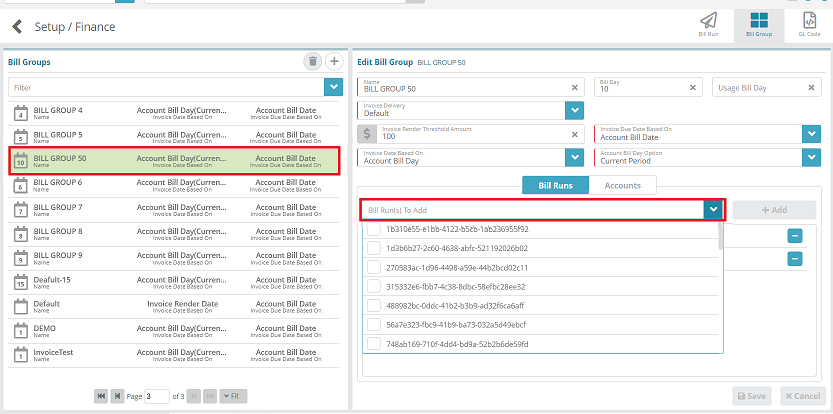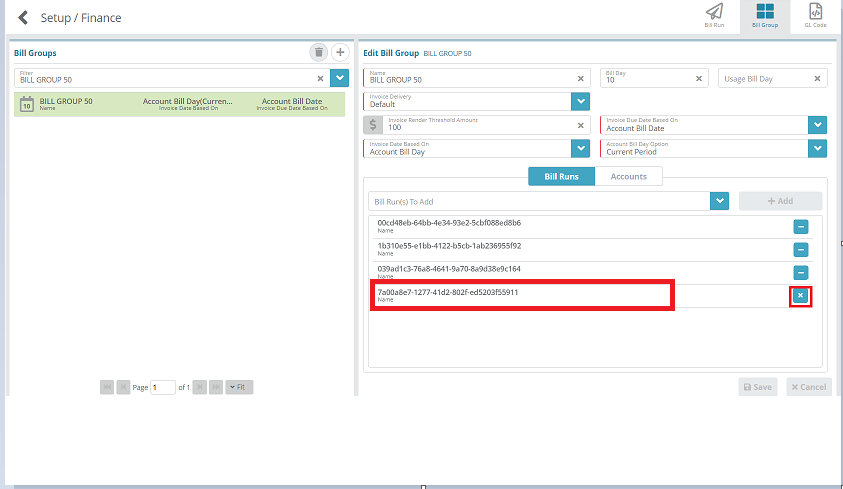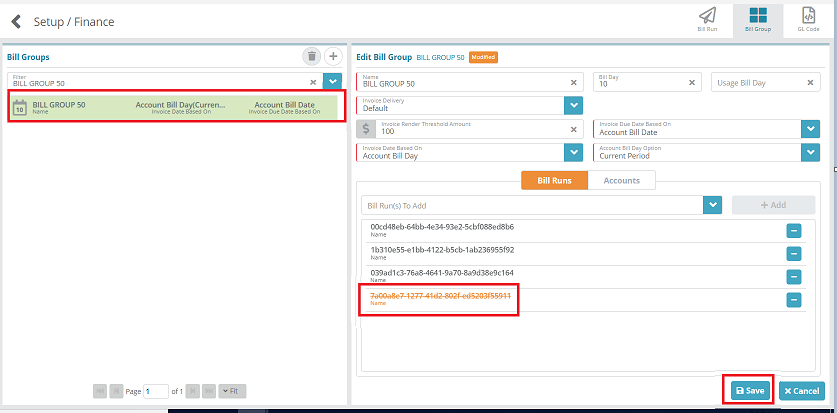Summary
Bill groups comprise a collection of accounts which are all billed alike (billed on the same day, using the same invoicing configuration, etc.). You can setup as many bill groups as you require, grouping accounts under bill groups by more than just their account type (for instance, you could setup one bill group for credit card customers and another for ACH customers).
A customer's bill group is selected when a new customer account is created. The bill group that is specified on existing accounts can be changed, however accounts which are not invoiced for subscription and usage charges will have the bill group option greyed out (the bill group settings of the account(s) being invoiced will be used in this scenario).
Prerequisites
An invoice delivery configuration needs to be defined before bill groups can be setup.
Process
1. Log into your Logisense Billing application
2. Click on the “Setup” menu then Finance. Then click on Billing.
3. Under Billing settings, Click on Bill Group.
The Bill Group Panel
The information in this panel reflects the currently selected bill group. From here you can change bill group details (fields will display a red left border if a value is required and purple text if the field is read-only and cannot be modified).
Note: Fields shown below with an asterisk indicate that the setting is the default value for new accounts setup under the bill group. Modifying these settings will not affect existing accounts under the bill group. Accounts are free to deviate from these default bill group settings (e.g. if the bill group's bill day is '1' the bill day for accounts under the bill group can be changed to a value other than '1'). Changing the value of settings that are not marked with an asterisk will update those settings on existing accounts setup under the bill group.
Bill Group Fields:
Name: a descriptive name for the bill group
Bill Day*: sets the default bill day for accounts. The bill day can be any number between 1 and 28. If this field is left empty the bill day of accounts created under this bill group will be the day that the account is created
Usage Bill Day*: sets the default day usage will be billed for accounts. The usage bill day can be any number between 1 and 28. If this field is left empty the usage bill day for accounts created under this bill group will be the day the account is created
Invoice Delivery*: specifies the invoice delivery settings to use. Delivery settings determine how the invoice is sent (e.g. emailed as a pdf attachment) and the invoice template to use (invoice branding, layout and content)
Invoice Render Threshold Amount: keeps the invoice from being generated until the total invoice charges meet or exceed the value specified in this field
Invoice Due Date Based On: used in conjunction with payment terms to set the due date on invoices
Account Bill Date: uses the most recent account bill date along with the payment terms configuration to determine the invoice due date. For instance, if the account's bill day is March 1st and the payment terms configuration is set to Net 20, then the invoice due date will be set to March 21st
Invoice Render Date: uses the day the invoice is rendered and the payment terms configuration to set the invoice due date. For instance, if the invoice is rendered on April 5th and payment terms are 'On Due Date' then the invoice due date is April 5th
Invoice Date Based On: allows you to configure when the invoice date is set
Invoice Render Date: the invoice date will be set to the date that the invoice is generated
Account Bill Day: the invoice date will be based on the bill day of the account. the 'Account Bill Day Option' field described below defines which period is used when setting the invoice date
Account Bill Day Option: this option is only applicable when the 'Invoice Date Based On' field is set to 'Account Bill Day'. This field lets you define the period the invoice date will be set to. E.g. if this value is set to 'Previous Month' and in October an account with a bill day of the 1st has an invoice generated, then the invoice date will be set to 'September 1st
Bill Runs tab
Bill groups need to be connected to one or more bill runs in order to bill the accounts that are in the bill group. Bill runs determine when billing executes, what is billed (recurring charges, usage charges, etc.) and if an invoice is delivered amongst other options.
Accounts tab
This tab shows the accounts that are setup under the bill group. The 'Filter Accounts' field here allows you locate specific accounts under the bill group.
The available actions are described below:
Adding Bill Groups
Under the Bill Groups heading, click the add icon
Under the Add Bill Group heading, enter the bill group details.
For e.g. as shown in Fig-1 enter the bill group name as BILL GROUP 20, ‘Bill day’ as 1, ‘Invoice Delivery’ as Default, ‘Invoice Render Threshold Amount’ as $100, ‘Invoice Due Date based on’ as Account Bill Date, ‘Invoice Date based on’ as Account Bill Day, 'Account Bill Day Option' as Current Period.
Select as Bill Run and Click on Add to add the Bill Run.
Click Save to add the new Bill Group.
Fig-1
Editing Bill Groups
Under the Bill Groups heading,t click the bill group you wish to edit. For e.g. Bill Group “BILL GROUP 50” is selected for modification as shown in Fig-2.
Under the Edit Bill Group heading, modify the bill group details for e.g. Bill Day is modified to 10 as shown in Fig-2.
Click Save when finished making changes and changes will be saved.
Fig-2
Deleting Bill Groups
Note: you cannot delete a bill group if it is in use. If you need to delete a bill group that is in use you will first need to change all accounts under the bill group to use another bill group and also remove the bill runs that have been added to the bill group
Under the Bill Groups heading, select the bill group you wish to delete. For e.g. Bill Group name “BILL GROUP 20” is selected to be deleted as shown in Fig-3.
Under the Bill Groups heading, click the bin icon
On the confirmation dialog that appears select Yes. The selected Bill group will be deleted.
Fig-3
Adding Bill Runs to Bill Groups
Under the Bill Groups heading, click the bill group you wish to edit
Under Edit Bill Group ensure the Bill Runs tab is selected and then click inside the text field labeled Bill Run(s) To Add. As shown in Fig-4, BILL GROUP 50 is selected and clicking inside the text field labeled Bill Run(s) shows list of Bill Runs that can be added.
Fig-4
In the list that appears check off the bill runs you wish to add to the bill group
Click the Add button to the right. As shown in Fig-5, A Bill run is selected by clicking on the checkbox.
Fig-5
Click Save to commit the changes. As shown in Fig-6, Bill Run selected in step 4 will be added once Save is clicked.
Fig-6
Removing Bill Runs from Bill Groups
Under the Bill Groups heading, click the bill group you wish to edit
Under Edit Bill Group ensure the Bill Runs tab is selected and then click the button shown below to remove from the bill group. As shown in Fig-7, the highlighted Bill Run is selected to be removed.
Fig-7
The “X” button will appear against the Bill Run selected for deleting as shown in Fig-7, click it to confirm that you wish to remove the bill run and the bill run you selected to delete will appear crossed out in the list as shown in Fig-8.
Fig-8
Click the Save button to commit the removal of the bill run. The selected Bill Run will be removed.
Next Steps
<<documentation team task: link to next configuration article>>
Related Guides
<<documentation team task: link to API guide which covers the same config process>>
<<documentation team task: link to Data Import guide which covers the same config process>>











